
Note: This article was originally published on shakticollaborative.co. Some information may be dated given the original publish date.
Meet Sabena Suri, Co-Founder and Chief Strategy Officer at BOXFOX, a Los Angeles based e-commerce gifting company that’s revolutionizing the art of gifting for the 21st century. At BOXFOX, Sabena wears many hats, namely managing the company’s Corporate Concierge program, driving B2B business development, and working closely with developers on site enhancements and solutions that are constantly improving the company’s offerings. Sabena shares with us her story of defining entrepreneurship in her own way, scaling an idea into a sustainable business and getting comfortable with the uncomfortable. Read on to learn more!
The Beginning
“I grew up in the San Francisco Bay Area in Fremont, which is an hour south of San Francisco. I’m the middle child, with an older brother and younger sister. My parents are from Delhi and came to this country separately. They then met each other here when my dad was 19 and my mom was 16.
I was around Indian culture a lot growing up. We had many friends who truly felt like family to us and we spent a lot of time together. There were a lot of South Asian kids at my school too so it felt pretty easy to reconcile my Indian and American identities. However, it became more difficult as I got older and went to college. In college I had an epiphany that I’d grown up a bit sheltered, and I’d had such a heavy Indian influence in ways I didn’t even realize until then. I felt like I had to adapt to more traditional American culture which I was totally open to, but hadn’t really experienced before. I had a very structured view of the world, especially when it came to my career path.”
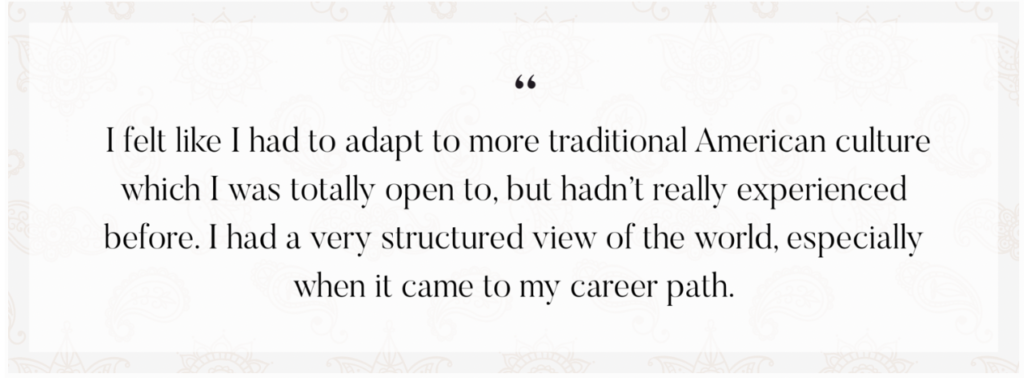
“I went into college thinking I wanted to do journalism. But in the first week of class, our professor told us that journalism was a dying industry and that we may want to reconsider pursuing it as a career. It was definitely a rude awakening, to say the least! I’d always been a good writer and really loved the journalistic side of it, but decided to look at more options. I ultimately decided to study public relations, as it was a great way to mesh journalism with strategic thinking. By studying PR, I got to think more about building brands vs. media.”
Where BOXFOX Began

“My first job post graduation was at Ogilvy, a renowned global marketing agency. I was in a management rotational program and it was an incredibly enlightening experience. I also met my future co-founder, Chelsea, at work and we became close friends.
After three years at Ogilvy, Chelsea came to me and told me that she had a business idea, and we started talking more about it. Chelsea also introduced me to Jenni, one of her friends from college who would become our third co-founder. The three of us started talking about a need in the market we had identified based on our personal experiences of not being able to find a beautifully designed, thoughtful gift, and realized there was an opportunity to leverage the power of the internet to create this experience for people.
Our original mission was to bring effortless gifting to people. We wanted to make it seamless to send a beautiful gift and allow the people in your life to know that you’re there for them even when you can’t be physically, which is key in the digital age we live in. One of the first marketing phrases we ever used was that ‘you have the intent, but not the time.’ We haven’t strayed from that original mission.”


“We were all working full time jobs when we first came up with the idea, but we got together around our kitchen table in Venice and pooled together $5K to start BOXFOX in November 2014. By October 2016, we were all able to transition from our jobs to working on BOXFOX full time. We started by putting together six pre-created gift boxes around themes like PAMPER, JETSET, HUSTLE, and THANKS, and over time, we expanded the business to allow people to pick and choose their own products on our BUILD A BOXFOX platform. We also now have a thriving corporate gifting business, servicing everyone from Fortune 500s to tech startups to small businesses.
“People were definitely skeptical of our idea in the early days. We realized that people often evaluate the quality of your concept based on what they have already seen and what they know. But when you are doing something very innovative, they don’t have anything to base their opinion on. We heard so many times that ‘there are a million subscription boxes out there, so why is this any different?’ It was tough to hear that. We were really young in our mid-twenties and we were so impressionable to that kind of criticism. What really helped us was having each other to lean on and believing in the mission. We knew why were doing this and we had done the research. We know BOXFOX was a solution that needed to exist. What was most important was us being clear and rooted in our reason for being.
Even after we hit the ground running, it was almost like some people were just looking for us to fail. We’d hear from people who were pretty condescending say things like they didn’t feel like BOXFOX was going to go anywhere. Or they’d keep checking in on us asking if we had raised money or sold any boxes. We had to learn to be comfortable with tuning that out and knowing we were building the business in our own way, not just for external validation.”
From the Kitchen Table to Growing the Business
“It’s been amazing to grow BOXFOX from just an idea to a business that’s more than the three of us co-founders. We’ve hired a fantastic team and it’s been a great learning experience for us to manage our team and build a culture that feels really authentic to who we are.”
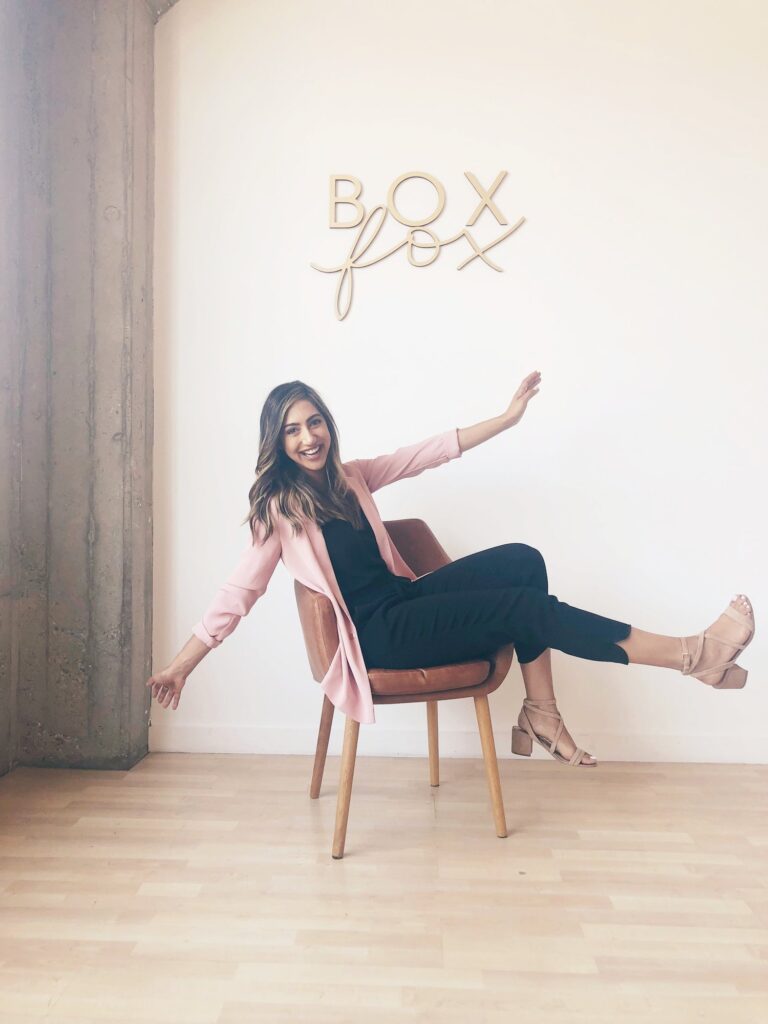
“In the startup world, everyone focuses on how customers are responding to your product and all the customer metrics. But now that we’re five years into the business, we’re starting to shift our focus a bit. We will always be thinking about our customers, but equally, we have to think about our employees too. We have a team we come to every single day. So how do we make sure that the type of culture we have here is really supporting our employees’ lives? How do we grow each person in their skill sets and experience? And pay them fairly and give them incredible benefits to help them live their best lives? Those are the questions that are really important to us.
I’ll also add that we did many things in non-traditional ways at BOXFOX. For example, we didn’t know for a while that we should have a board of directors or informal mentors in place. As we’ve grown we’ve been really lucky to have found mentors and women founders who have helped us make some great connections and expand our network. It is awesome to see more and more female founded companies around us. I’m such a believer that women are great at identifying consumer needs – only a woman can see certain things in the world. The more we can share the stories of amazing women out there, the more examples we can set for the next generation.”
What it Takes to Start

“Just starting somewhere is really good advice. I hear from a lot of people who have a big idea and can see a million things happening with it. It’s amazing to have the grand vision, but in order to get there you have to do something first. The vision can’t feel so far off or crazy that you can’t even take the first steps to register a domain, or start mixing recipes in your kitchen. Once you take the first step, you’ll have something real and the momentum will keep you going. You have to treat your idea, no matter how early it is, like a company even before it’s a company. It requires the same amount of respect, attention and dedication that you would give a real job.
If you’re working a full time job but have a business idea, be really intentional about quitting your job to start. You want to leave at a time that is not going to make you feel like you’re putting yourself and your business at too much risk. You should map out milestones to hit, like paying yourself somewhat of a salary for example. Think about the traction you want to have before making the jump and work towards a plan.”

“I’d also suggest minimizing all the distractions in your life except what’s really important. I used to be somebody who thought I could do it all – have an active social life, have a career, relationships and family all at once. But when we starting BOXFOX, I had to pick three things that were going to matter to me the most – work, friends, and family – and everything else had to go away. That became a really good strategy to stay focused and grounded.
I’ll also add that self doubt is something we still go through no matter how long we’ve been entrepreneurs. What was key for me was realizing that at a young age, nobody really has the answers. We often read about entrepreneurs born to be entrepreneurs, or about entrepreneurship being in someone’s blood. But you have to realize that nobody really has it all figured out and that there’s no one way to do things. Everyone is learning on the go and that’s just the reality of being an entrepreneur. Getting comfortable with the uncomfortable is the way you’ve got to live.”
On Culture
“Balancing both my South Asian and American identity has been an interesting journey, and there’s so much I’ve realized, especially in my 20’s. The pressure around getting married is definitely a cultural truth that’s a part of being a South Asian woman. For me, I’m very lucky that my parents are pretty non-traditional. My mom worked on Wall Street and is very progressive in her thinking. She’s pushed me to put my career first and never sacrifice my own desires which is rare and something I never take for granted.”
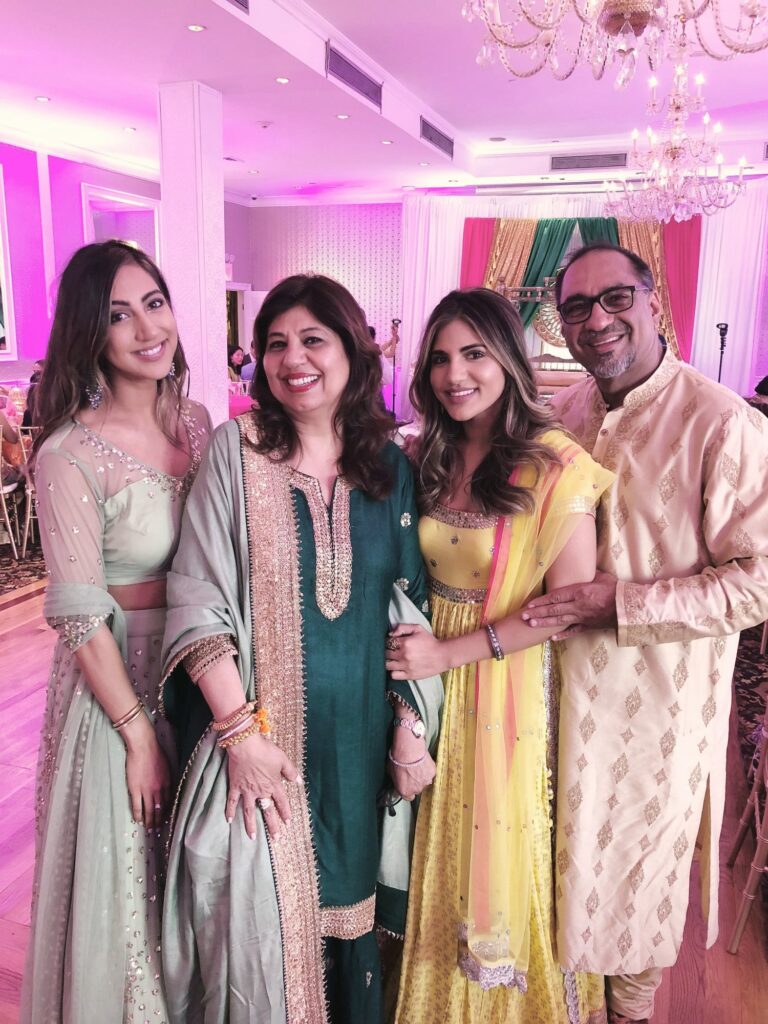
“Something else I’ve noticed in our community is that we can be much better at communication. There’s a lot of secrecy among both parents and children within South Asian culture; it’s almost a given. I’m a firm believer that bridging the generational gap starts with open communication. That’s where we can learn something from American culture. If South Asian parents and children were a little more receptive to hearing why the other person feels a certain way, it can build more understanding and compassion and get rid of some of the judgement and friction that exists.
South Asian culture can also be very collectivist compared to American culture which is more individualistic. It’s a difference that can make things like self-care be perceived as selfish — which, as we now know, is anything but. We need to promote self-care in our communities, knowing that we’ll all be healthier, happier, better versions of ourselves.”
Just for Fun

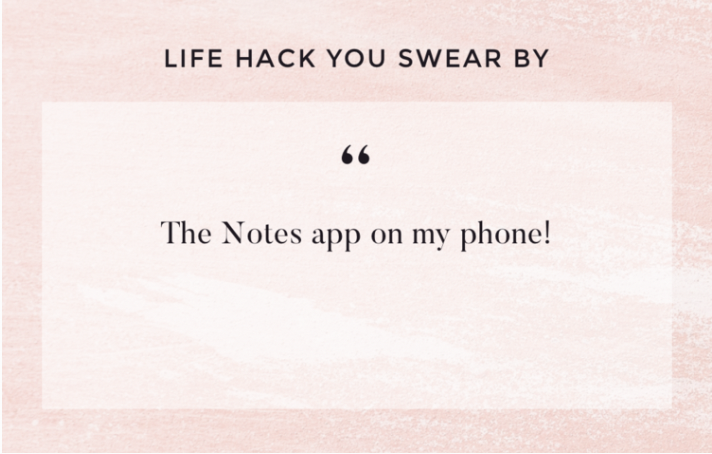
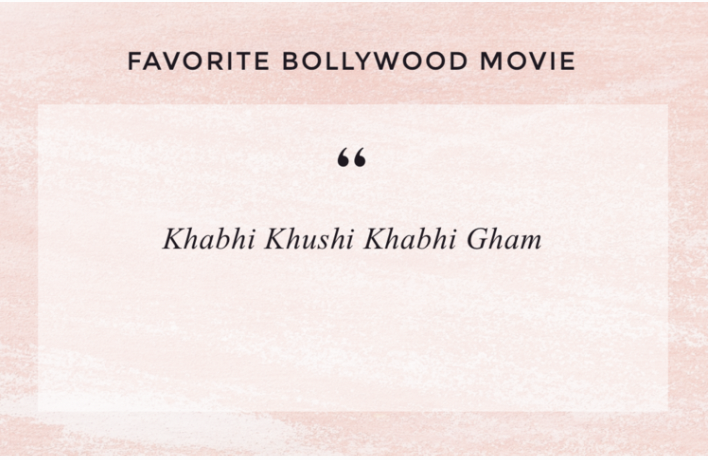

***************
Author Bio:
Shakti Collaborative illuminates narratives of strength, choice, and culture in the South Asian community.



